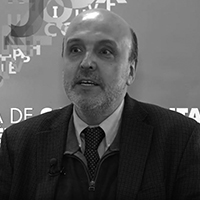Aims
The Chair of Energy Sustainability at the UB promotes research on the production, supply and use of the energy needed to maintain social welfare and development, placing special emphasis on aspects related to their economic, environmental, and social impacts. The Chair pursues the following aims:
- To develop a research programme in energy and environmental matters. The Chair develops various lines of research, with special emphasis on the following: R&D in the energy sector, energy and the environment, energy efficiency, energy poverty, energy markets, electricity and gas transmission and distribution, and power sector regulation in general.
- To promote research in energy and environmental topics through the establishment of a permanent research group. The year 2014 saw the creation of the Emerging Research Group in Energy Sustainability recognised by the Government of Catalonia (2014SGR531) for the excellent research carried out and giving it institutional recognition. Subsequently, in 2017, the Group was recognised as a Pre-Consolidated Research Group (2017 SGR 739).
- To promote the supervision of doctoral thesis projects in the field of energy sustainability. Since its creation, the Chair has supervised 6 doctoral theses.
- To encourage scientific debate through seminars and the visiting professors program in areas related to the Chair’s activities. This objective is highlighted in the tremendous efforts made by the Chair through the seminars and visiting professors program in which more than 45 university professors coming from relevant national and international institutions have already participated.
- To collaborate in an international framework with world-class universities and research centres in the field of energy. The Chair has created collaborative networks with universities such as Copenhagen School of Energy Infraestructure (CSEI), the University of Münster, the Université Paris-Saclay, the University of Mannheim, the Florence School of Regulation, and Warwick Business School. Moreover, it takes part in international research projects and encourages members of the Chair to participate in research visits and residencies.
- To promote the publication of research studies in JCR journals in the areas covered by the Chair. Since its inception, the research group has regularly published in prestigious journals (JCR, Q1).
- To organize international scientific congresses related with the Chair’s activities. Since 2013, an International Academic Symposium has been organized annually with great success, featuring the participation of leading experts in sustainability and energy from the academic world. In addition, taking the best academic contributions from each Symposium, a Special Issue is prepared for publication in an important scientific journal in the field of energy economics.
- To promote teaching in the field of energy economics. The Chair actively collaborates with the development of the University of Barcelona’s Masters Degree in Renewable Energy and Energy Sustainability by teaching the program of Energy Economics, the Circular Economy and organizing the Seminars on professional practices.
- To bring research results closer to society. The Chair carries out various activities and publications with the goal of transferring knowledge in the field of energy economics to firms and society in general.
This group is positioned as a top-calibre research institution with international scientific recognition, as such, its projects and the profiles of its team members conform with the demanding standards of ICREA (the Catalan Institute for Research and Advanced Studies) and the National Plan for Scientific Research, Development and Technological Innovation. The group’s scientific works also readily meet the demanding criteria of the academic journals recognised in the JCR.
The annual assessments of the research group’s scientific activity include the number of articles accepted in journals recognised by the JCR—an indicator of the quality of the research undertaken, as well as participation in conferences and accredited international workshops.
The Chair, led by professor María Teresa Costa Campi and affiliated to the IEB, was created by an agreement between the University of Barcelona and the Foundation for Energy and Environmental Sustainability (FUNSEAM), whose members are the Repsol Foundation, the ACS Foundation, Enagás, Exolum, Naturgy, Fundación Cepsa, EDP Renováveis and Redeia.
Chair of Energy Sustainability
E-mail: chairenergysustainability@ub.edu
Twitter: @Energy_UB_IEB
Research Topics:
R&D in the energy sector
This line of research examines entrepreneurial commitment to R&D and the degree of technological innovation through an analysis of the firms involved, and of the relations among market structure, regulation and innovation. The methodology applied will involve the creation and specification of corresponding models and their estimation using contributions from the new empirical industrial economics.
Energy and the Environment
There is a global concern regarding the rise of greenhouse gas emissions and their impact on Climate Change. Considering that the power sector is responsible for one of the highest shares of these emissions justifies the greater attention devoted to environmental issues within the sector. This research focuses on the study of possible actions or measures for the supply and demand sides of the sector to be able to attain objectives related to climate change mitigation and environmental policy. This topic will also focus on investment and costs of emissions.
Energy Markets
Competitive wholesale and retail energy markets face major challenges in the context of systems that are, each and every time, more decarbonized and integrated. This research topic is focused on the analysis of the effects of the increasing penetration of renewable energy, the flexibility required to address intermittency within the context of reliability and adequacy, and the evolution of the integration of national and supranational markets.
Networks
Current network segments of the sector need to adapt to the new conditions that have risen as a consequence of the major changes which have occurred during the past decades, both within the networks and in liberalised activities. Moving from a passive role to a more active function, such networks have become increasingly relevant by providing continuous stability to the system. This research is aimed at the study of transmission and distribution networks, as isolated components and as integrated parts of a system that influence and, at the same time, are affected by the rest of the sector.
Power sector regulation
Within the context of a sector where liberalized and regulated activities coexist, analysing the effect of regulatory and policy changes is crucial for a better understanding of their implications. This research involves the ex-ante and ex-post evaluation of the impact of regulations and policies on the power sector, with particular attention to the welfare consequences.
Energy efficiency
Energy efficiency is one of the primary ways to combat climate change, reduce emissions and, at the same time, improve business competitiveness. The objectives of this research area are to improve knowledge about the barriers that industrial enterprises must overcome to make investments and introduce innovations that improve their energy efficiency, as well as to evaluate the results of policies implemented to improve efficiency.
Energy poverty
One of the most significant political developments in recent times is the explicit recognition by various European institutions of the need to consider the social consequences when designing climate and energy policy. The transition to a new socially just energy model must be shaped by tools that respond to these social consequences, which include, among others, reducing inequality and energy poverty for the most vulnerable segments of society. This research consists of identifying and characterising people who suffer from energy poverty in order to design appropriate social and political responses.



















